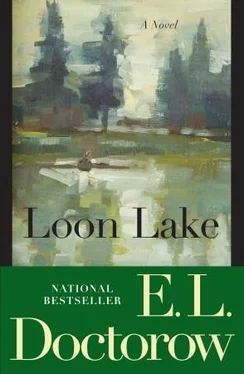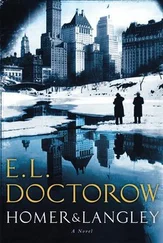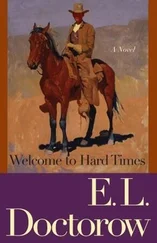I became aware of this girl Libby in her pale green uniform. She sat very close to me, the starched front of her uniform rose and fell with her breathing. When I glanced up from the book I found her face near mine, her head bowed and her eyes on the page, but her consciousness all directed to me. Her full lower lip was impressed into a suggestion of voluptuousness by her front teeth. She had thick wavy hair. What sweet appropriate modesty of being. Her trust was part of it, or so I understood — the willingness of the others of us to find a place and live our lives within it, making our trembling alliances and becoming famous and powerful to each other.
I turned back to the book. Some of the people there were such big shots they needed only one name to identify themselves. Leopold, one of them had written. Of Belgium.
I said to Libby, “Hey, how long have I been here, anyway?”
“We were taking off the summer covers and putting the rugs down,” she said. “It was that night. I never hope to hear what I heard that night.”
“Well, when was it, please?”
“Two weeks ago.”
“Wasn’t someone here then? Didn’t you have visitors?” She looked at me and then looked away. She glanced at the book. She wanted it back.
“I saw the train, Libby. People were on it. Is anyone here now?”
She shook her head.
“Well, how come I don’t see anything that recent in the guest book?” She was silent a long while. I knew I was extending her loyalty. I gazed at her and waited for my answer. She looked discouraged. “Not just anyone gets to sign,” she said finally.
“Is that right?” I said. She wouldn’t look at me now.
“I think someone’s calling you, Libby.”
“Where?” She went to the door, opened it and listened. I leaned over with a painful lunge to the bedside stand. In the little drawer was a fountain pen. I unscrewed the cap, shook a blot on the floor, spread open the guest book and signed my name with a flourish.
“What are you doing!” Libby said. Her hand was on her cheek and she stared at me in horror.
“Joe,” I wrote. “Of Paterson. Splendid dogs. Swell company.”
I fell back on the pillow. By signing the guest book, did I mean to be going on my way? I felt the pretense, as well as any other, washed away in a wave of weakness and despair.
The girl grabbed the book and ran.
She had a friend, as it turned out, a man who lived on the grounds as a kind of permanent houseguest. He came to look at me later that day, peering in the door with an expression of wonder very odd in a full-grown middle-aged adult.
He was a large heavy man. He was bearded. His hair was overgrown and unkempt. His eyes were blue and set in a field of pink that suggested a history of torments and conflicts past ordinary understanding. His weight and size seemed to amplify the act of breathing, which took place through his mouth. His nose looked swollen, a web of fine purple lines ran up his cheeks from the undergrowth, and all the ravage together told of the drinker.
He said his name was Warren Penfield. He wanted to speak about moral responsibility.
He padded around the room in a pair of old tennis sneakers. He wore baggy trousers belted below his stomach, and an ancient tweed jacket with patches at the elbow. Beneath the jacket was what seemed to be a soft graying tennis shirt part of the collar folded under he didn’t seem to be aware of this.
“I can understand your feeling better than you can, young man. I spend my life understanding feelings, yes, my own and others, that’s what I do, that’s what poets do, that’s what they’re supposed to do.”
“You’re a poet?”
“I’m the poet in residence here,” he said, drawing himself up slightly trying to tuck his shirt in glancing then at me from the corner of his eye.
I thought I would never know the end of the subtle luxuries with which the wealthy provided themselves.
“So I can understand your feelings. But I also understand poor Libby’s, good God she’s one of the few decent people around here, and now she’s in fear for her job. Do you realize what it would mean for her to lose her job? Of course I’ll do what I can, the Bennetts aren’t here right now, fortunately, I’ll think of something, yes, I’ll speak to Lucinda, I suppose I can, but that’s not the point. You should have realized the girl was responsible for anything you did. She was nice to you, she made you her friend, she shared something she knew, and that’s how you repaid her.”
I liked him enormously. I was smiling I was admitted into his realm of moral concern without passport credentials references of any sort. There I was a hobo boy lying on this cot in this weird place suppurating, for all he knew, in my dereliction, not a pot to pee in, and he was trying to recall me to my honor. He assumed I had it!
He saw me smiling and started to smile too. Then we were laughing.
“Of course it was wicked, a good wicked joke, God knows I can enjoy a joke at his expense. I wish there were more of them. Incidentally, he himself is not totally devoid of humor, you know.”
“Who?”
“Bennett. I’ve studied him a long time. He’s a very capable human being. Quite charming at times. The mistake most people make is to jump to conclusions before they even meet him.”
“Well, I’ll try not to,” I said and we laughed again.
At that moment my mother-keeper came in, took my tray, gave Penfield a dirty look, and left.
“Dreadful woman,” he said. “They all are. Except for Libby, of course. They despise me. I’m more than they are but I have no place as they have. They play all sorts of tricks on me, I have to beg for my meals. But when the Bennetts are here they’ll invite me to dine and then I’m served like I’m the king of England.”
I saw that he suffered from this, as from everything, in a state of expressive self-magnifying complaint.
“Well, I suppose I should go. How do you feel, by the way?”
“Lousy.”
He pulled up his jacket sleeve and showed me on the inside of his left arm a pale scar from the wrist to the elbow. “You’re not the only one, I want you to know. They treed me seven years ago when I came here one night — just like you.”
One morning on his bed at the foot a folded suit of dark green. He dressed in it and looked for the first time into the hallway outside the room where he had been since he was carried there on some door was a mirror and there he was thin pale-faced boy pale as a sheet, with a sparse stubble on the rim of the jaw, a head of uncombed hair looking too big for the body, and a hunch as if he were still flinching from the teeth, from the snarling face of the mountainous night.
Something has leaked out through the stitches and some of the serious intention of the world has leaked in: like the sense of high stakes, the desolate chance of real destiny.
There was a distant railroad track with telephone poles regularly spaced down the side of my neck over the clavicle across the breastbone. There was another spur line on either arm and the right leg.
I had no feeling in the fourth finger of my right hand.
Thus I found myself on a brilliant morning raking leaves in the shadow of the great sprawling lodge house of the auto magnate F. W. Bennett. I was not to consider myself employed, however. My Loon Lake parents would as frankly have sent me on my way but they did nothing without the approval of their employer, who was still to return.
I felt weak in the knees, I couldn’t have gone anywhere anyway. I was glad to hold on to the rake.
The lodge house was two stories on the land side, three on the lake side — the land dropped precipitously from the crest of the hill — and its walls were logs, uniformly brown, set with casement windows and crowned with a wood shingle roof of many angles and regularly spaced dormers. The trees oak maple elm, and though it was still September, a heavy leaf fall everywhere behind the meadow of my encounter, a burning wood of orange and gold and behind this on a distant mountain, ageless stands of evergreen against the bright blue sky.
Читать дальше











